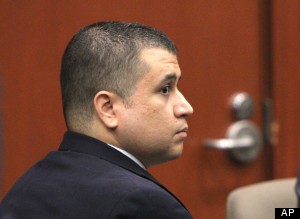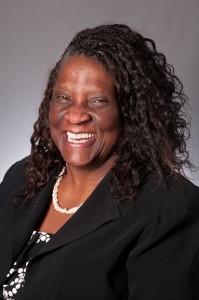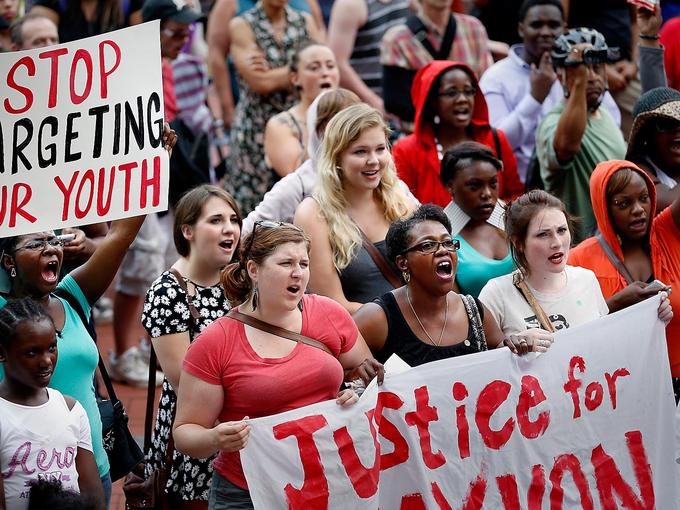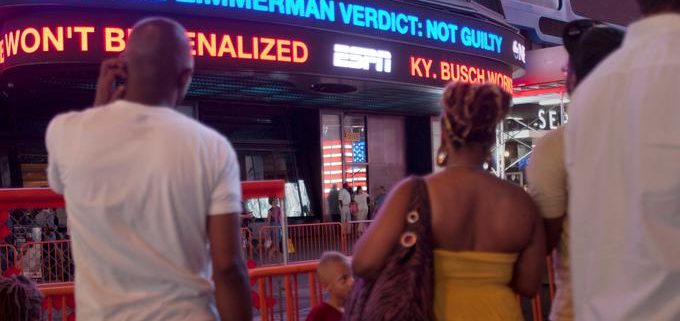Commentary: George Zimmerman and Me
George Zimmerman and Me
By Eva Patterson


The twelve members of my Black women’s reading group had just sat down to dinner outside at the end of a beautiful day. We were on a weekend retreat in Mendocino County, and a feast had been prepared for us. We were thanking Chef Cheryl when the phone rang. Our friend Stephanie took the call and reported that George Zimmerman had been found “not guilty.”
We twelve – Black women lawyers, psychologists, an architect, and an editor – all sat in stunned silence. We had talked about what we thought the jury would do. Some of us were sure that George Zimmerman would be convicted on manslaughter.
The more jaded among us thought he would walk, but that karma would catch up with him because in his heart of hearts – despite telling Sean Hannity that young Trayvon’s murder was God’s will – Zimmerman knew he had done wrong. We felt that this monstrous thing he had done would weigh on him, and even if found “innocent,” Zimmerman would find no peace. No justice. No peace.
An eternal optimist (one has to have that approach as a civil rights attorney), I felt badly but not devastated. I had expected that he would walk. Once I realized that the witnesses for the prosecution were providing evidence that commentators felt helped the defense, I concluded that all was lost, so the verdict did not surprise me. Attorneys I respect felt that he would be convicted on involuntary manslaughter so I held out hope that justice might be done.
Things Will Be Alright
Later that evening, I saw an email from my buddy Lei-Chala Wilson telling us that the NAACP was calling for the Department of Justice to investigate the possibility of a criminal civil rights challenge to the profiling and stalking of an innocent Black teenager. I shared this with my friends and felt a little better.
The next morning at breakfast, one of my friends told me that despite being a sound sleeper, she dreamed of white men raping Black women with no negative consequences to the rapists. I realized that the acquittal had struck a nerve, but I still felt that justice would eventually prevail.
Fear and Anger Around White People
On my way back home, I stopped in Cloverdale, a town about 90 minutes north of San Francisco. It was here that more complex feelings started to surface.
I stopped at a gas station to pick up some snacks. The shop connected to the gas station was filled with white people and one Latina. I thought: “Wow. All these people have heard the verdict. Do they now think that I am fair game? Will someone hurt me now that they know that Zimmerman walked?”
On the drive home from Cloverdale, I listened to radio commentary on the verdict. I thought of all my friends with Black sons and how fearful they must be. I heard my buddy Ben Jealous, head of the NAACP, breaking it down for Candy Crowley on CNN.
I then arrived in Berkeley to buy a new journal. As I walked, I felt the twin emotions of vulnerability and rage. I never had any particularly negative feeling about white people. “Some of my best friends are white,” but I was filled with rage at every white face that I saw.
I thought to myself: “Why did you white people allow this to happen?” This was clearly an irrational thought but my emotions were raw. As matter of fact, I am sure that white folks in Berkeley were as outraged about the verdict as I was. But I was still filled with fury, as well as no longer feeling safe in my Black skin.
I also understand viscerally the notion of white privilege. The white mothers I saw who have white sons will never have to worry that some George Zimmerman type of vigilante will profile and murder their sons. Of course, white mothers with bi-racial sons do not have the benefits of this skin privilege.
Bakke. Reagan. Rodney King Trial.
2000 Presidential Coup.
I have had these profound feelings of being a vulnerable Black person at a few other moments in our history. When the Bakke decision was announced, I felt that society did not really want educated Black people. When Ronald Reagan was elected, I felt that someone was going to come to my door and take me away. When the Simi Valley jury acquitted the police officers who beat Rodney King, I felt that my life as a Black person was not valued by society. When Black voters were stripped from the Florida voting rolls in 2000 resulting in a stolen election, I felt vulnerable.
Those old bad feelings were back again. I saw a Black man standing across the street on College Avenue where people line up every day to buy ice cream cones. I wondered what he was thinking. I wondered if he has a son. I wondered how vulnerable he felt.
Whole Foods
After I bought my new journal, I called Carolyn, our hostess in Mendocino County, and shared the fact that after leaving the warm cocoon of sisterhood and re-entering the real world, I was feeling rage and wanted to write about it.
She felt that sharing my feelings in a public way might help people understand how some Black folks are feeling today. As I walked through Whole Foods, I was wondering if the cool people of Berkeley were feeling badly about the verdict. A white woman cut in front of me where the yogurt was and I felt full of rage. As I checked out, the cashier asked me how I was and I told him that the verdict has upset me. He agreed. My anger level came down because this young white man shared my feelings about this injustice.
Am I Next?
I got back in my car feeling safe as I drove home. I had one final errand to run near 98th Avenue and International Avenue in East Oakland. A Black minister said that his young son asked, “Am I next?” This made me cry.
 Kumbayah
Kumbayah
It’s Monday and I feel less vulnerable. People all over the country have expressed their anger at the verdict and at the fact that young Black men appear to be fair game. My three white friends from college spent a good part of Saturday and Sunday in grief about this situation. My compañera Claudia Pena wrote the following:
“At the rally I attended yesterday, two posters caught my eye. One black woman had a sign that said ‘are my sons next?’ One white man had a sign that said ‘nobody follows me anywhere.’ ”
I think that pretty much sums it up.
I was with the group of protesters who took over a freeway. That group was probably the most racially diverse group I’ve ever marched with, including two elderly white people who had signs that said “Zimmerman is guilty.” In fact, the first person to get arrested for breaching the police line was a white man.
Black people are not alone fighting against this racist system that attempts to devalue Black life. We were all there. There were signs that read “Greeks for Justice for Trayvon” and “Dignidad y Justicia para Trayvon,” as well as “Asians Against Racism,” and “I am White and I Stand for Trayvon.” Something about knowing we were all in it together made it just a little bit easier last night.
Onward
Well, I am back at it. Working with great folks – white, Black, Latino, Asian American, Native American. We are all in this together. This weekend felt raw, but wounds heal and forward progress will be made.
After re-reading this, I was not sure that I should share it. I have concluded that it might be helpful for us to share our true feelings with each other. We are not always filled with notions that “we will overcome.” We sometimes feel beaten down. I no longer feel that way, but I surely felt miserable yesterday. The good thing is that everyone reading this felt the same way. I know that now.
Be well. Stay strong. Keep on.
Ms. Patterson is president and founder of the Equal Justice Society, a national legal organization focused on restoring Constitutional safeguards against discrimination. To learn more about EJS, Click here.
The views and commentaries expressed here are soley those of their authors.





